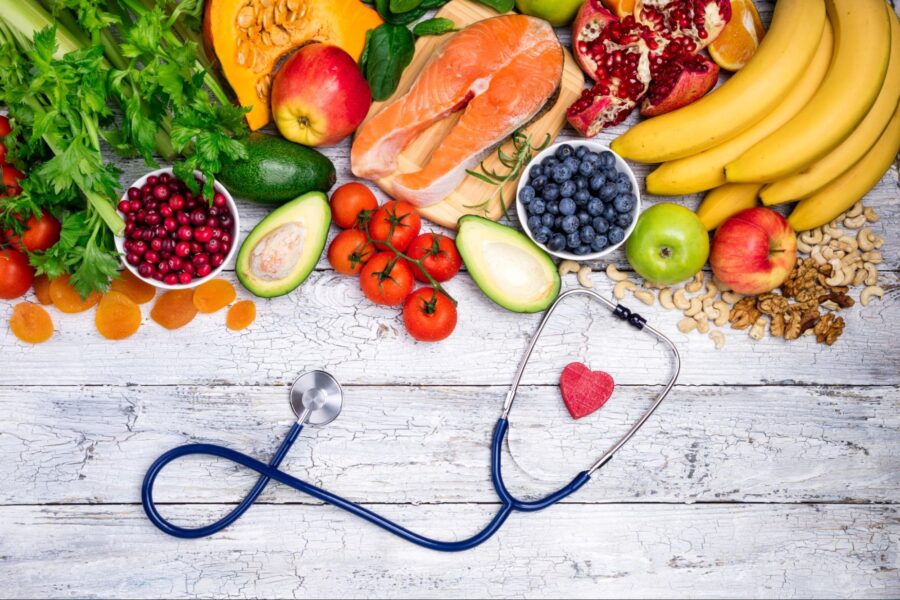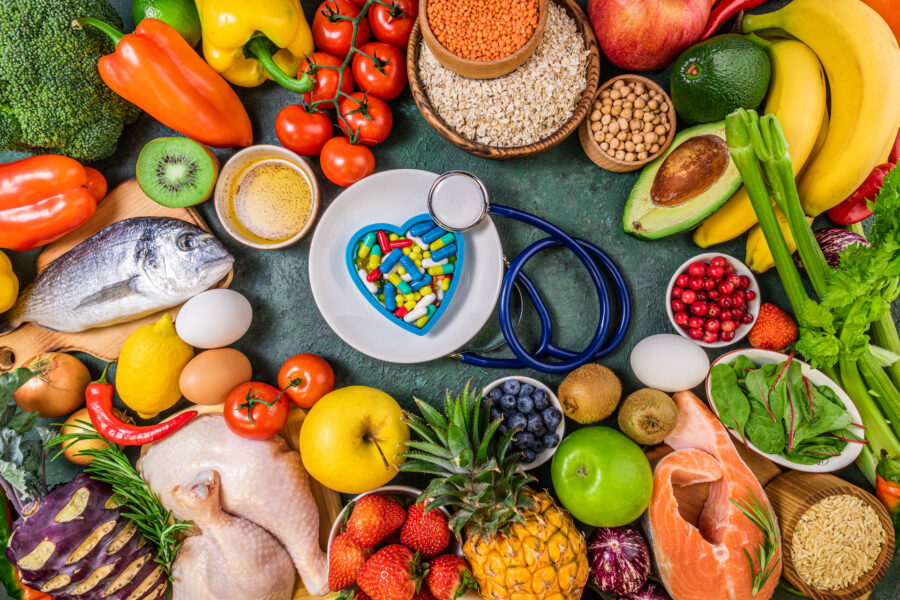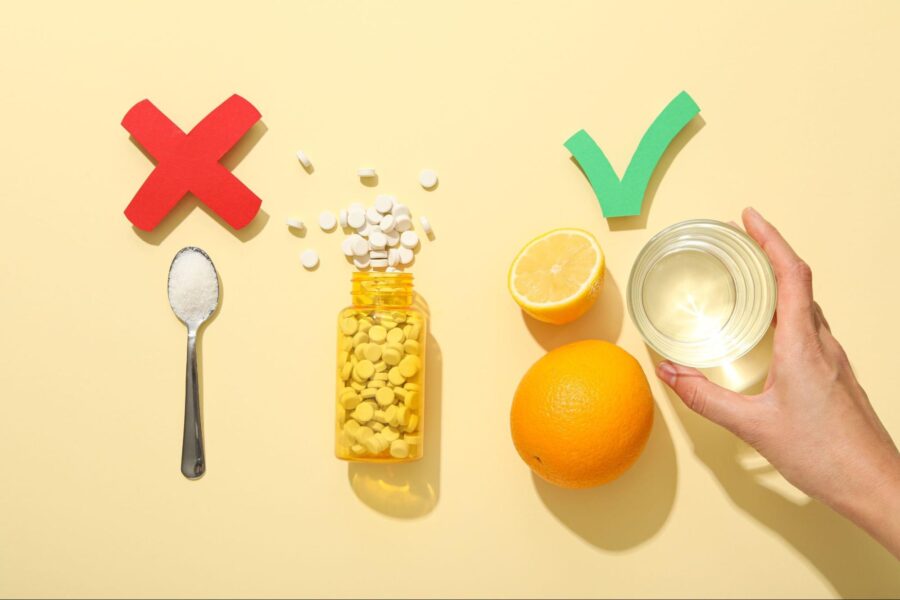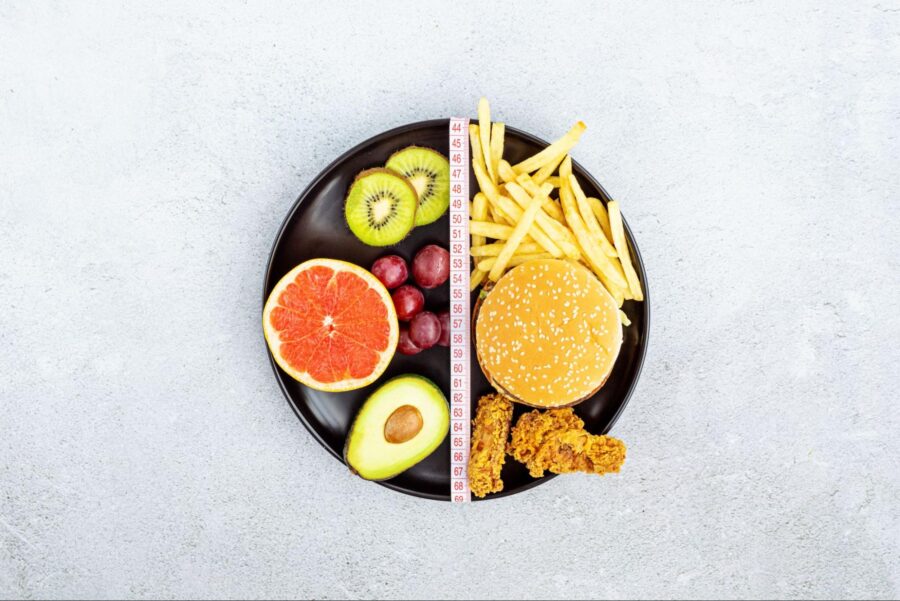The term "superfood" is a catchy buzzword, but it lacks a strict scientific definition. Generally, superfoods are foods boasting exceptional nutrient density – they pack a powerful dose of vitamins, minerals, antioxidants, and other beneficial compounds. While they won't magically cure diseases, research suggests the nutrients in superfoods might play a role in promoting overall health and reducing the risk of some chronic conditions.
Remember, superfoods are meant to complement a balanced diet, not replace it. They shouldn't be seen as a substitute for medical treatment or a license to indulge in unhealthy habits.
Myth 1: Superfoods are a magic bullet for perfect health.
 Photo: Envato Elements
Photo: Envato Elements
Fact: The term "superfood" is more a marketing buzzword than a scientific classification. While certain foods like berries, leafy greens, and nuts offer concentrated sources of vitamins, minerals, and antioxidants, no single food can guarantee perfect health. Focusing on a single item may lead to neglecting other important nutrients your body needs.
A truly healthy diet is about balance and variety. Focus on incorporating a wide range of whole, unprocessed foods like fruits, vegetables, whole grains, legumes, and lean proteins. This approach, combined with regular exercise and healthy lifestyle habits, is a far more effective path toward achieving optimal health than relying on any single "superfood."
Myth 2: Only exotic, expensive foods qualify as superfoods.
 Photo: Envato Elements
Photo: Envato Elements
Fact: The "superfood" label often gets slapped on trendy, exotic ingredients with hefty price tags, like goji berries or acai. This creates the misconception that only these rare foods hold special nutritional powers. However, the truth is that many superfoods are readily available and surprisingly affordable.
Everyday foods like blueberries, broccoli, spinach, beans, oats, and even garlic pack impressive nutritional punches. Don't get fooled by marketing hype – some of the healthiest superfoods can be found right in your local grocery store, without breaking the bank.
Myth 3: Superfoods will prevent diseases.
 Photo: Envato Elements
Photo: Envato Elements
Fact: While superfoods offer valuable nutrients that support overall health, they aren't a shield against disease. Disease development is complex, influenced by factors like genetics, lifestyle, and environment. No single food, however nutrient-dense, can completely eliminate your risk.
Superfoods should be part of a balanced approach to well-being. Eating a nutritious diet rich in these foods can contribute to disease prevention, but it's essential to combine this with other healthy habits like regular exercise, stress management, and getting enough sleep for optimal protection.
Myth 4: The more superfoods, the better.
 Photo: Envato Elements
Photo: Envato Elements
Fact: While superfoods are excellent additions to your diet, more isn't always better. Overemphasizing certain foods can lead to an imbalance in your intake, potentially leaving you deficient in other essential nutrients. Our bodies need a diverse array of vitamins, minerals, and other compounds for optimal function.
Focus on including a variety of colorful fruits, vegetables, whole grains, and healthy proteins – this will naturally lead to incorporating a good mix of "superfoods". Remember, moderation and a well-rounded diet are key. Think of superfoods as powerful additions to an already healthy eating pattern, not a replacement for it.
Myth 5: You must eat superfoods raw to get the benefits.
 Photo: Envato Elements
Photo: Envato Elements
Fact: While raw foods offer immense value, cooking sometimes unlocks hidden benefits. For example, cooked tomatoes provide more bioavailable lycopene (a powerful antioxidant) than raw ones. Similarly, cooking cruciferous vegetables like broccoli slightly reduces their ability to block iodine absorption, which can be beneficial for those with thyroid concerns.
Myth 6: Superfoods can replace necessary medical treatment.
 Photo: Envato Elements
Photo: Envato Elements
Fact: Superfoods, while packed with beneficial nutrients, cannot substitute for necessary medical treatments. If you have a medical condition, it is crucial to seek professional guidance from a doctor or licensed dietician. Superfoods can be a helpful addition to a treatment plan, but they should never be used as a substitute for prescribed medications or therapies.
Relying solely on superfoods to manage serious health conditions can be dangerous and may worsen the situation. Always consult with a healthcare professional to create a treatment plan that is safe, effective, and tailored specifically to your needs.
Myth 7: Fresh produce is always superior to frozen or canned.
 Photo: Envato Elements
Photo: Envato Elements
Fact: The belief that fresh produce always reigns supreme is a common misconception. Frozen and canned fruits and vegetables can be just as nutritious, and sometimes even more so! Produce destined for freezing is often harvested at peak ripeness and frozen quickly, locking in nutrients. Fresh produce, on the other hand, may lose nutrients during transport and storage.
Additionally, frozen and canned options often offer greater convenience and affordability. Don't underestimate these alternatives – they can be valuable tools for incorporating a variety of healthy fruits and vegetables into your diet, regardless of season or budget.
Myth 8: "Superfood" is a scientifically regulated term.
 Photo: Envato Elements
Photo: Envato Elements
Fact: The term "superfood" has no official scientific or regulatory definition. It's primarily a marketing term used to promote foods perceived as exceptionally healthy. While many foods labeled as "superfoods" do offer nutritional benefits, the term itself is not based on any standardized criteria.
It's important to be discerning when encountering the "superfood" label. Don't assume a food is automatically superior just because of this designation. Focus on the specific nutrient content and how a food fits into your overall dietary pattern, rather than relying on a catchy marketing term.
Myth 9: Superfoods make up for an otherwise unhealthy diet.
 Photo: Envato Elements
Photo: Envato Elements
Fact: Unfortunately, no amount of superfoods can magically undo the damage of a consistently unhealthy diet. If your diet mainly consists of processed foods, sugary drinks, and excessive saturated fats, sprinkling a few blueberries on your cereal won't make up for it.
While superfoods offer valuable nutrients, they are just one piece of the puzzle. True health comes from a balanced eating pattern focused on whole, minimally processed foods. Think of superfoods as powerful boosters within a healthy diet, not as a shortcut to offset unhealthy choices.
Myth 10: If a food is healthy, its processed form is too.
 Photo: Envato Elements
Photo: Envato Elements
Fact: Just because a food starts off healthy doesn't mean all its processed forms retain the same nutritional value. Processing can significantly alter the nutrient profile of foods. Often, beneficial components like fiber are stripped away, while sugar, sodium, and unhealthy fats are added in.
For example, a whole orange provides fiber, vitamins, and antioxidants. However, orange juice has most of the fiber removed and can be high in sugar. Always read food labels and be mindful of added ingredients, even when the base food might be considered a "superfood." Prioritize whole, unprocessed versions whenever possible.
The Bottom Line

Enjoy the incredible benefits of superfoods, but keep expectations realistic. Include them as part of a balanced diet rich in whole, unprocessed foods, and never underestimate the power of a healthy lifestyle overall.
For more stories like this, visit BK Reader and Healthy NYC.




